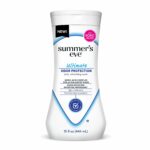Health Hazards of Fragrance in Cleaning Products: What You Don’t Know Might Hurt You
Physicians for Social Responsibility Environmental Health Policy Institute
Alexandra Scranton
November 3, 2011
Take a walk down the cleaning aisle in your grocery store, and there’s no doubt that fragrance is a major player in the cleaning products industry. The combination of all those products next to one another can be overwhelming – and for those who are especially sensitive, it can even be debilitating. But what about for most of us? The strong smell of cleaning products may encourage us to make our shopping trip down the aisle quicker, but could it actually be harming our health?
Unfortunately the research on impacts of fragranced products is extremely limited. One reason for this is that research into fragrance impacts is hampered by the fragrance industry’s long standing tradition of holding fragrance ingredients as trade secrets. While you can measure a person’s exposure to a fragranced product by calculating the frequency and duration of use, you can never really be sure what chemicals they are actually being exposed to. Those individual fragrance chemicals are kept secret from researchers, consumers, and even regulators. And individual fragrances can differ tremendously – as they can be made up of potentially hundreds of different chemicals each.





